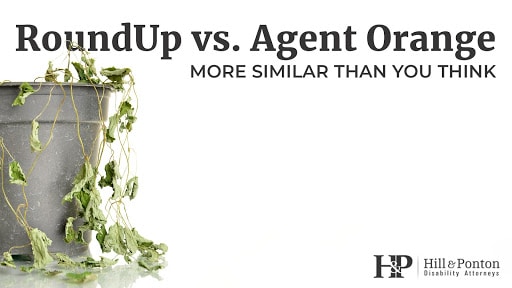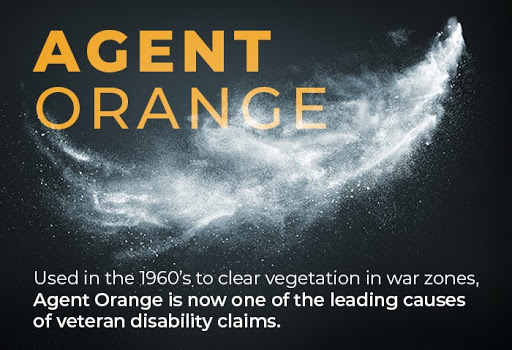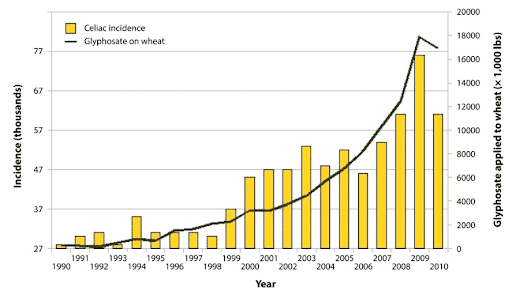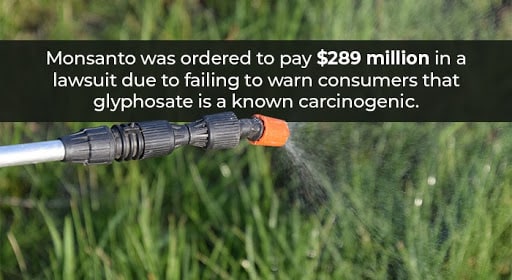Agent Orange vs. RoundUp: Understanding The Health Effects of Weed Killers
In the 1960s, the United States started using herbicides with the chemical TCDD, tetrachlorodibenzo-p-dioxin, or more commonly know as Agent Orange, to kill vegetation in areas of Vietnam and part of Laos. The goal was to allow troops to flush out the enemy, as well as to provide less exposure to insects, dangerous wildlife, and unknown diseases. These defoliated areas also allowed troops to build camps and bases to house themselves and operations. This project was known as Operation Ranch Hand and lasted from 1962 to 1971.
The project later proved to have negative effects on human health.
Dioxin is now one of the leading causes of claims for disability among Vietnam War era veterans, as the effects of Agent Orange have been significant. This chemical is a proven human carcinogen and has been linked to several types of cancers. It’s also connected to diseases and health effects such as diabetes mellitus type 2, birth defects, Parkinson’s disease, and ischemic heart disease. Rightly enough, this chemical was banned.
However, replacements needed to be developed…..enter agribusiness giant Monsanto.
A Monsanto scientist developed the active ingredient glyphosate in 1970. By 1974, Monsanto had started marketing the product as “RoundUp©,” a broad-spectrum herbicide. Both commercial and individual customers purchased this product as a weed killer. It was purchased not only commercially, but by individual consumers as well. This weed killer killed common yard weeds within hours.
Military Use of Glyphosate
The U.S. military started using glyphosate in eight products under three basic names: RoundUp©, QuickPro©, and Rodeo/Aquamaster©. QuickPro© is a dry formula and Rodeo/Aquamaster© kills weeds at water lines such as next to lakes, rivers, etc. All three products, as well as their variations, are currently listed on the Armed Force Pest Management Board Standard Pesticides List.
Glyphosate & Public Health
Glyphosate does not cause any harm to humans or animals, according to Monsanto. Even the U.S. Environmental Protection Agency (EPA) states that glyphosate is safe when used carefully (although no exact definition of the word carefully is offered). However, Agent Orange was deemed safe to spray within certain parameters as well and later proved the opposite.
Glyphosates have specific directions to follow when the average consumer uses them to kill common weeds in our average yards. To be deemed “safe” these directions are to be followed:
- Choose a day that is not rainy or windy;
- Wear long pants, long sleeved shirt, gloves, goggles, and a mask;
- Cover any other plants you want to keep safe
I don’t know about any of the rest of you, but I have never followed any of those directions. I make sure my pets stay away. But if I needed to spay a dandelion in my driveway, I grabbed the bottle, sprayed the weed, and put the bottle back. There are warnings of course, such as those instructing you to keep pets and people away until completely dry, but the product doesn’t explain why you should use these precautions.
Here is why: On August 11, 2018, Monsanto was ordered to pay a record $289 million to Mr. Dewayne Johnson, a groundskeeper in California, among 5000 other claimants, due to failing to warn consumers that glyphosate in its weed-killing products was a known carcinogen. The jury found that Monsanto knew the chemical was dangerous and failed to warn consumers properly. Mr. Johnson was diagnosed with non-Hodgkin’s lymphoma. Monsanto, recently purchased by Bayer AG, now faces increasing class action lawsuits against its products due to exposures and subsequent illnesses.
In 2015, the International Agency for Research on Cancer (a division of the World Health Organization) concluded that glyphosate was “probably carcinogenic to humans.” A recent study published by Oxford University states that not only are there serious effects due to the use of glyphosate such as changes in the metabolism, cancer risk, and systemic inflammatory conditions, previous forms of evaluating the risks are also obsolete based on the different ways that glyphosate are utilized. In other words, creating genetically altered food (GMOs) with glyphosate leads us to measure the risks differently than the way it was measured when food was sprayed with chemicals. These findings show that the use of glyphosate could be a public health concern.
Now granted, Mr. Johnson sprayed glyphosate much more often than most average consumers and in amounts much greater than I would ever use on my measly 2/3 acre of yard. However, with chemicals, what affects one person one way, can affect another in a completely different way. We know this because not everyone who was exposed to Agent Orange got cancer and diabetes, but enough more did that it showed the link scientifically.
Glyphosate and Gluten Allergies/Celiac Disease
In 1990, approximately 27,000 people were known to have had a celiac incidence. The rate of use of glyphosate was less than 500 per 1000 lbs. of wheat treated. By 2009, the USDA and the CDC show that the rates of Celiac incidences increased to 77,000 compared to an increase of glyphosate to almost 16,000 x 1,000 lbs. per wheat.
A recent study by Samsel & Seneff, 2013, argued that glyphosate may be a key contributor to obesity as well as other health problems like Alzheimer’s disease, Parkinson’s disease, infertility, depression, and cancer. Their reasoning is that glyphosate suppresses specific amino acids and bacteria, up to 35% of those in a human’s system, and prevent them from managing the essential nutrients our bodies need to function properly, leading to an overgrowth of pathogens. What most people consider to be celiac disease or a gluten allergy are quite possibly the digestion of glyphosates and the negative effects the chemical is having on the body’s internal flora and fauna. The American Cancer Society has itself shown an 80% increase in non-Hodgkin’s lymphoma since the early 70s, when glyphosate was introduced to the market.
And even worse, the weeds that were being killed by the glyphosate are now becoming resistant.
What Does This Mean for You?
Hopefully, nothing. However, if you are suffering from cancers such as non-Hodgkin’s lymphoma; systemic inflammatory conditions such as sarcoidosis (which can lead to organ failure and the need for transplant), systemic lupus erythematosus, or scleroderma; Parkinson’s disease, celiac or gluten problems, or even metabolic issues that are otherwise unexplained; and you have been in contact with glyphosate, it may be worth checking to see if exposure may be a link to your conditions. Here is the important link: chronic inflammatory conditions can cause DNA damage, which can lead to cancers. For example, ulcerative colitis and Crohn disease have increased risks of colon cancer. According to the National Center for Biotechnology Information (NCBI), some of the many (too many to list here) side effects of glyphosate found are:
Disruption of gut bacteria leads to:
- Kidney failure
- Inflammation
- Autoimmune thyroid disease
Transition metal chelation leads to:
- Neurodegenerative disease
- Heart disease
- DNA damage/cancer
- Anemia
CYP enzyme inhibition leads to:
- Osteoporosis, cancer
- Teratogenesis
- Gallbladder disease, pancreatitis
- Liver disease, macrocytic anemia, kidney failure
- Venous thrombosis
Tryptophan deficiency leads to:
- depression, nausea, diarrhea
How Roundup has Altered Our Agriculture
Monsanto has not just developed the herbicide for removing unwanted vegetation, it has used glyphosate to engineer crops that are resistant to herbicides, allowing farmers to spray fields with RoundUp and not kill the food crops being grown for human consumption. RoundUp Ready© soybeans and canola were introduced in the 1990s, with crops of corn and sugarbeets following. Monsanto also has a program called “preharvesting,” where farmers are taught how and when to spray entire crops of consumable food in order to kill it while still in the ground, drying it out to cause haresting machines less damage and to yield the highest crops. This process basically kills the food on the stalk, in effect drying it out so that when it is harvested, there is less moisture allowing for less wear and tear on harvesting equipment. Preharvesting, per Monsanto’s guidebook, is used on wheat, barley, oats, canola, flaxseed, peas, lentils, soybeans, and dry beans.
Monsanto continues to claim that over 800 scientific studies have shown that glyphosate is safe for humans, but we have to wonder, did those studies use tests that would accurately depict this chemical’s effects on humans or did they use outdated methods developed for past chemicals that are now dinosaurs in the new-world chemical game.








